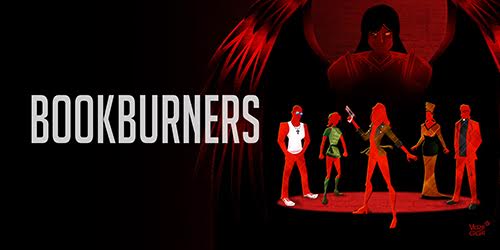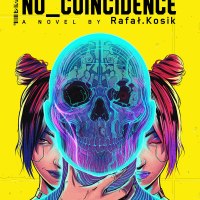Celebrate Buffy’s 20th Anniversary with Bookburners!
Like many geeks growing up in the late 90s and early 2000s, I was a huge fan of the Buffy the Vampire Slayer TV show, watching it religiously to follow the adventures of our Sunnydale gang. And do you know who else are big fans? The author team behind the Serial Box series Bookburners, a serialized fiction story where magic is real and some books have teeth! If you’ve read the serial, then you’ve probably spotted many similarities between it and Buffy, especially in the hunting-magic sense and the dynamics between the characters. After all, Max Gladstone, Margaret Dunlap, Mur Lafferty and Brian Francis Slattery all consider themselves super fans of Buffy and have been influenced greatly by the show.
On this day, March 10, 2017, fans around the world are celebrating the 20th anniversary of Buffy the Vampire Slayer season one. Hard to believe it’s been twenty years already, but time sure flies! To join in the fun, this weekend Serial Box is offering a half-off promo on Bookburners in honor of Buffy, so if you’ve been curious about the series now is your chance to see what the fuss is all about. In case you missed my review, this is a seriously kickass series based around secret team of agents that hunts down dangerous books containing deadly magic.
For more about the Bookburners and the ideas and influences that went into it, the authors have written a great piece on how they feel Buffy has transformed television and continues to inspire today, along with links and promo details included at the end of the post. I hope you’ll enjoy and check out Bookburners!
Margaret: Looking back twenty years after Buffy, it’s hard to remember that so much of what it did was revolutionary at the time. Like, the “big bad” who gave each season its own flavor and self-contained arc that then built the story of the series as a whole; no one else was doing that in the same way. Babylon-5 famously had its five-year plan, but it always presented itself as a deliberate exception, a grand experiment. Buffy was just television. Quippy, girl-centric television on the WB, no less. Pinning the television revolution to one show is always going to be a gross oversimplification, but Buffy served as a proof of concept that TV dramas didn’t have to live and die only by their week-to-week stories.
Now a structure that combines season-arcs and standalone episodes is so baked into our consciousness, when our team sat down to break the first season of Bookburners, we sort of took it for granted that was how we were going to tell our story. Which is an insanely fast shift, when you think about it.
Max: Buffy set a high water mark for a certain kind of quippy, self-conscious television: stories in which the characters know they’re in a story, know stories like the ones they’re in—and know those stories don’t end well. It’s a fine line to walk. Lean too far to the left, and the characters become so self aware the story loses all horror, mystery, wonder, or even basic emotional affect. Lean too far to the right, and the horror crushes the life out of the quips, and out of our characters. The jokes just seem grotesque. The Buffy team built a world where students possessed by hyena spirits could eat the school principal, and we’d all recognize that this was the kind of thing that happened in Sunnydale and on some level everything would turn out fine, more or less, while at the same time knowing that the principal really had been torn apart by his students. And the creators didn’t stop there—that careful tension left the viewer unprepared for the serious emotional right hooks the series later started to throw.
That balance is at the heart of our work on Bookburners, too—a fun story, about people having fun, with plenty of blood in. A balance that leaves you off guard for the blow.
Brian: Buffy the Vampire Slayer is the show that I’m always most afraid of ripping off when writing Bookburners. I was a huge fan of the show when it was on the air, to the point that I possibly did a little less well in graduate school because of it. At the time, seasons 3 and 5 in particular seemed to me to be about as good as television got at the time.
But even the high drama of those seasons didn’t quite prepare me for the way the series ended overall. Maybe the final season was a little uneven. Maybe some of the drama got a little overplayed. Maybe it got a little too dark. But the final conceit, in which Buffy found a way to change the rules that had tied her down, and break the patriarchy that had made her its servant, still stands in my mind as a nearly perfect way to end that story. Not only because it turned the logic of the show inside out in an intellectually satisfying way, but because it showed the consequences of that radical decision on a human scale. The images in that final sequence—the flush of beatification on Willow’s face when she casts her last spell, followed by the smiles of strength on the faces of not only the women assembled to fight demons, but a girl who stays the hand of her abuser, a girl at bat who knows she’s going to knock that next pitch all the way out of the park—have stayed with me since that final episode aired. The show’s writers could have killed Buffy off at the end of the series (and did once, a couple seasons before that) and it would have made sense. Instead, they set her free. Needless to say, we’ve been taking notes.
Mur: One out of many things Buffy did right was female relationships. We saw in Heathers and Mean Girls the narrative of the best friends who secretly compete and hate each other and, even if you were a girl and had a best friend, you wondered if girl friendships were the rare thing and the backstabbing relationships were the norm. Then Buffy came along, and she and Willow created a super strong bond, and later with Anya and Tara, the Scoobies were heavy on the tight girl friendships. Cordelia did manage to bring the bitchy rivalry aspect to the show, but she didn’t hang around for long.
In Bookburners we have Sal and Grace developing a slow but tight friendship that is tested, but stays strong. Asanti plays more of a parental role, but her female/female connections to Sal and (to a lesser extent) Grace are also tight. The men in our team play roles that connect to each other, and the women, but they do not overshadow the women’s connections and experiences. In a world where the Bechtel test is a depressing test that so many stories manage to fail, Buffy didn’t, and Bookburners takes its lead from that awesome show.
![]()
To see how the writing team was influenced by Buffy, check out Bookburners here, and for today and this weekend only we’re offering half off Season 1 using code BuffyPromo1 and half off Season 2 using code BuffyPromo2. To redeem, go to www.SerialBox.com.














How fun! I have Buffy season 1 on hold for me at the library right now. Somehow, I’ve never seen it before 😅 I’m also reading and loving the fourth Bookburners episode right now (the first by Mur Lafferty–Mogsy, you were right, her episodes rock!). Now I’m super excited to compare and contrast! Thanks for the great post about this weekend’s super deal!
LikeLike
I know, right??! I wasn’t even really paying attention to the authors for each episode as I was reading, but when I went back to check up on my favorite or most memorable eps, they all happened to be written by Lafferty. She’s great! 😀
LikeLiked by 1 person
All the episodes are clever, but so far Lafferty manages to bring the characters to life the best! Now I HAVE to read Six Wakes haha
LikeLike
Wow – 20th anniversary. That really is hard to believe!
Lynn 😀
LikeLike
LOL I feel old!
LikeLike
I was always more of an Angel fan myself…
LikeLike
I watched Angel religiously too! I think all the girls my age back then had huge crushes on David Boreanaz 😛
LikeLiked by 1 person
I used to think he was a pretty big guy in Angel. Then I watched several seasons of Bones, where he really filled out, and then watched the first season of Angel again. He was a skinny twerp! 😀
LikeLike
Oh yes, he’s buffed up big time in Bones! I really liked him in that show too 🙂
LikeLiked by 1 person
Goodness, 20th anniversary. I turn 22 later this year. Which is probably why I’ve never seen Buffy? I definitely grew up hearing about it when I was little, but it was never something that really interested me. I bet if I started marathoning the show though… I think I’d like it. 😀
Wonderful post! Have a lovely weekend, Mogsy. =)
Alyssa @ The Eater of Books!
LikeLike
Yeah, Buffy was definitely a phenomenon of the 90s 🙂
LikeLike
20 years! It’s kind of shocking….
LikeLike
It really is how crazy fast time flies!
LikeLike